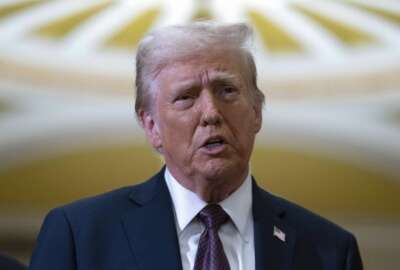2011 a year of congressional showdowns
The year can be summed up by a trio of showdowns, said Peter Schroeder, a staff writer with The Hill newspaper, in an interview on Federal Drive with Tom Temin. The...
wfedstaff | June 4, 2015 3:31 pm
By Jack Moore
Federal News Radio
@jmooreWFED
Federal agencies took a hit in the wallet from Congress this year.
But the tight budgets aren’t likely to be alleviated with the turning of the calendar, especially not after a year of crises — manufactured or otherwise — on Capitol Hill.
The year can be summed up by a trio of showdowns, said Peter Schroeder, a staff writer with The Hill newspaper, in an interview on Federal Drive with Tom Temin.
First was the near-government shutdown in April, “as the two parties were kind of squaring off over spending levels for federal agencies and other aspects of the federal government,” Schroeder said. A deal was struck just an hour before the government was to shut down for the first time since the 1990s.
That was followed by the wrangling over the summer about how, and if, Congress should extend the government’s borrowing limit. Schroeder called it “another high-profile, high-stakes standoff that was averted at the last minute.”
However, the deal wasn’t enough to avert a downgrade from one credit-rating agency.
Most recent was the payroll tax standoff, “which was another major feud between the two parties that ended up being averted just as the deadline was rapidly approaching,” Schroeder explained.
Even though the circumstances and the issues differed, the trend seems likely to continue, he added.
And one recurring theme is the key part played by government expenditures. “The notion — how much should the government be spending, where should the government be spending its money, how should it be spending it — has kind of been central to all of the issues throughout the year,” he said.
Add to that the growing intractability between the two parties and the budgetary squabbling will likely only ramp up — especially with 2012 being an election year.
Another issue sure to come to the fore next year is the specter of automatic cuts, triggered by the congressional supercommittee’s failure to come up with a bipartisan deficit-cutting plan.
The gridlock means $1.2 trillion in automatic cuts, known as sequestration, starting in 2013. Already, some lawmakers have said they’ll find ways to stave off some of those automatic cuts, especially to the Defense Department. The White House, for its part, has indicated it will veto any such measures.
“So I think knowing there’s a ticking clock, when it comes to these automatic cuts, I think that’s going to be a major issue in 2012,” Schroeder said.
Copyright © 2025 Federal News Network. All rights reserved. This website is not intended for users located within the European Economic Area.





